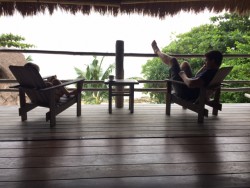- Home » Expat Articles » Interviews » American Expat Living in Singapore - Interview with Jennifer
American Expat Living in Singapore - Interview with Jennifer
| Published: | 29 May at 9 AM |
Want to get involved?
Become a Featured Expat and take our interview.
Become a Local Expert and contribute articles.
Get in touch today!
Become a Local Expert and contribute articles.
Get in touch today!
Filed: Interviews,Singapore
Jennifer is an American embracing the expat life in Singapore. She enjoys travel, cooking, running and raising her two children. Jennifer's expat blog is called Blooming Expats (see listing here)
Where are you originally from?
Since my father was in the US Air Force, I was an Air Force brat, and my childhood involved moving a lot. By the time I finally graduated high school in Alaska, I had moved eight times. My moves were all in the United States, but we lived in five very different states.
In which country and city are you living now?
My family of four currently resides in Singapore.
How long have you lived in Singapore and how long are you planning to stay?
We are on our second move to Singapore. We were here for two years, were repatriated by my husband's company to the United States, then two years later moved back to Singapore again. We have been here for a total of almost four years now.
Why did you move to Singapore and what do you do?
My husband grew up moving around Europe as an expat attending international schools. He really wanted to give his children that experience. He actively sought a role within his company that would move us abroad. We spent two years in Singapore, and then we repatriated back to corporate headquarters in the States.
After we moved back to the States, my whole family was unhappy and we really missed Singapore. My husband began actively searching opportunities in Singapore. He found an exciting opportunity with a technology startup here in Singapore. I was a stay at home mom for the first two years we were here, and now I work part time at my daughters' international school and write an expat travel blog.
Did you bring family with you?
We are a family of four, plus a dog, all along for the ride.
How did you find the transition to living in a foreign country?
To be honest, I found Singapore to be a fairly easy transition. Everyone speaks English, the schools are great, there are plenty of other expats in the same boat as you, and you can find almost anything you need here. I embraced life here from the start. I think making the transition is all in your mindset. If you see it as a great adventure, then it will be. If you are unhappy about the move, you will have a hard time finding joy in the assignment.
Was it easy making friends and meeting people; do you mainly socialise with other expats?
In our first stint, we made a lot of new friends and mainly socialized with other expats. This time around, though, my husband works for a local company and I work with a lot of locals in my job. This has been great in fostering friendships with people in the local community and has made the experience this time around more rounded.
What are the best things to do in the area; anything to recommend to future expats?
We are really getting a lot out of our travel experience here. When we repatriated last time, we regretted that we had not seen as much of this part of the world as we would have liked. This time around we are making a big effort to travel the region. I encourage future expats to make the most of their time here, as Singapore is a great jumping off point for regional travel.
What do you enjoy most about living in Singapore?
We really love the travel, the community and the warm island weather. We have discovered more outdoor things to do this time around, such as the park connector network, and have increased the amount of time we spend enjoying the beaches and outdoors here. Singapore has amazing attractions and a really vibrant night life and restaurant scene.
How does the cost of living in Singapore compare to home?
While Singapore is ranked as one of the more expensive cities in which to live, I don't find it to be too high compared to our last place, in the San Francisco Bay Area, or New York City, where we lived before that. Our rent is about the same, and you can live on a budget here if you need to do so. After rent, the most expensive items on our budget are food and transportation. We don't have a car and try to utilize Grab and the MRT, which saves us loads. However, my family can't give up fresh fruits and vegetables, cheese and yogurt, so our grocery bill continues to be double what it was in the States.
What negatives, if any, are there to living in Singapore?
A lot of expats struggle with the weather and being so far away from home. Some find it very hard to understand a lot of the locals speaking Singlish, as the cadence and word order is very unusual. After a year or so, understanding Singlish is no longer a challenge, and you get used to the weather in a few months. The challenge comes when there is a family crisis back home and it is hard to get back quickly.
If you could pick one piece of advice to anyone moving to Singapore, what would it be?
My advice would be to choose schools first, then choose a neighborhood nearby to make it easier to socialize with people from the school community. The school community is the first place most new expats make friends, and it makes it easier to transition.
What has been the hardest aspect to your expat experience so far?
The hardest aspect of my experience so far was when we were repatriated. We were really unhappy and it wasn't by choice, so we had a really hard time accepting the move back home. It took almost two years for us to adjust to life back home, and then we promptly gathered our things and moved back to Singapore at our first opportunity.
When you finally return home, how do you think you'll cope with repatriation?
Next time I do finally move home, I hope it will be on my own terms when I am ready to make the move. I think that would make repatriation much easier to manage. When we repatriated the first time, it was challenging to be back in a place we didn't want to be. Our friends' lives had changed, so we had to start over with friendships to some degree. We changed neighborhoods and schools, which helped a lot. The next time I repatriate I will make more of an effort to reconnect with our old friends.
What are your top 5 expat tips for anyone following in your footsteps? Here's the interview with Jennifer...
Where are you originally from?
Since my father was in the US Air Force, I was an Air Force brat, and my childhood involved moving a lot. By the time I finally graduated high school in Alaska, I had moved eight times. My moves were all in the United States, but we lived in five very different states.
In which country and city are you living now?
My family of four currently resides in Singapore.
How long have you lived in Singapore and how long are you planning to stay?
We are on our second move to Singapore. We were here for two years, were repatriated by my husband's company to the United States, then two years later moved back to Singapore again. We have been here for a total of almost four years now.
Why did you move to Singapore and what do you do?
My husband grew up moving around Europe as an expat attending international schools. He really wanted to give his children that experience. He actively sought a role within his company that would move us abroad. We spent two years in Singapore, and then we repatriated back to corporate headquarters in the States.
After we moved back to the States, my whole family was unhappy and we really missed Singapore. My husband began actively searching opportunities in Singapore. He found an exciting opportunity with a technology startup here in Singapore. I was a stay at home mom for the first two years we were here, and now I work part time at my daughters' international school and write an expat travel blog.
Did you bring family with you?
We are a family of four, plus a dog, all along for the ride.
How did you find the transition to living in a foreign country?
To be honest, I found Singapore to be a fairly easy transition. Everyone speaks English, the schools are great, there are plenty of other expats in the same boat as you, and you can find almost anything you need here. I embraced life here from the start. I think making the transition is all in your mindset. If you see it as a great adventure, then it will be. If you are unhappy about the move, you will have a hard time finding joy in the assignment.
Was it easy making friends and meeting people; do you mainly socialise with other expats?
In our first stint, we made a lot of new friends and mainly socialized with other expats. This time around, though, my husband works for a local company and I work with a lot of locals in my job. This has been great in fostering friendships with people in the local community and has made the experience this time around more rounded.
What are the best things to do in the area; anything to recommend to future expats?
We are really getting a lot out of our travel experience here. When we repatriated last time, we regretted that we had not seen as much of this part of the world as we would have liked. This time around we are making a big effort to travel the region. I encourage future expats to make the most of their time here, as Singapore is a great jumping off point for regional travel.
What do you enjoy most about living in Singapore?
We really love the travel, the community and the warm island weather. We have discovered more outdoor things to do this time around, such as the park connector network, and have increased the amount of time we spend enjoying the beaches and outdoors here. Singapore has amazing attractions and a really vibrant night life and restaurant scene.
How does the cost of living in Singapore compare to home?
While Singapore is ranked as one of the more expensive cities in which to live, I don't find it to be too high compared to our last place, in the San Francisco Bay Area, or New York City, where we lived before that. Our rent is about the same, and you can live on a budget here if you need to do so. After rent, the most expensive items on our budget are food and transportation. We don't have a car and try to utilize Grab and the MRT, which saves us loads. However, my family can't give up fresh fruits and vegetables, cheese and yogurt, so our grocery bill continues to be double what it was in the States.
What negatives, if any, are there to living in Singapore?
A lot of expats struggle with the weather and being so far away from home. Some find it very hard to understand a lot of the locals speaking Singlish, as the cadence and word order is very unusual. After a year or so, understanding Singlish is no longer a challenge, and you get used to the weather in a few months. The challenge comes when there is a family crisis back home and it is hard to get back quickly.
If you could pick one piece of advice to anyone moving to Singapore, what would it be?
My advice would be to choose schools first, then choose a neighborhood nearby to make it easier to socialize with people from the school community. The school community is the first place most new expats make friends, and it makes it easier to transition.
What has been the hardest aspect to your expat experience so far?
The hardest aspect of my experience so far was when we were repatriated. We were really unhappy and it wasn't by choice, so we had a really hard time accepting the move back home. It took almost two years for us to adjust to life back home, and then we promptly gathered our things and moved back to Singapore at our first opportunity.
When you finally return home, how do you think you'll cope with repatriation?
Next time I do finally move home, I hope it will be on my own terms when I am ready to make the move. I think that would make repatriation much easier to manage. When we repatriated the first time, it was challenging to be back in a place we didn't want to be. Our friends' lives had changed, so we had to start over with friendships to some degree. We changed neighborhoods and schools, which helped a lot. The next time I repatriate I will make more of an effort to reconnect with our old friends.
- Travel as much and as often as you can afford. This was our biggest regret when we moved back, we didn't feel we had traveled enough. Get on the lists right away for budget airlines and make the most of their sales to make travel more affordable. Every time I met someone new, I would ask them where their favorite trip had been so far. This is a great way to get new travel ideas. My favorite island escapes can be found at https://bloomingexpats.com/2017/04/11/easy-island-getaways-with-children-from-singapore/.
- Dive right in and become a part of the expat community. Making friends will help you adjust to the move, and they will understand and can help you figure out the local challenges. Join the community building groups at your kids' school, go to the AWA or other groups and meet as many people as you can. Attend meetups from Facebook groups to meet like minded people.
- Join Facebook groups to get quick help with your questions. Singapore Expat Wives is a great one for women, although it is a secret group. Ask new people that you meet to add you, and they will. There are great social groups out there filled with people in your same shoes. Embrace it!
- Grocery shopping in Singapore can be a frustrating process. It seems you can never find all of the ingredients in your recipes without going to several different stores. My tip would be to utilize RedMart for bulk items and basics. They deliver right to your door and take the hassle out of grocery items. Then use Cold Storage and FairPrice to get the rest of your items as needed.
- A lot of expat families hire a helper when they move here, and I encourage you to do so. It takes a lot of the stress of daily living off your hands, and it is great to have the help, especially when you have children at home. My tip would be to hire a transfer helper, one who has already been with another family. I use https://www.anisya.com/ to hire a helper. This is an online marketplace where you can search for workers who have posted their profiles. You arrange your own interviews, and it is so much more fair for the workers. Anisya only charges the helpers $50 if they are placed, as opposed to $1,000-$2,000 that they pay at an agency to be placed. You can do the application on your own through MOM, which is super easy to do, and save yourself a bundle.
I began writing my blog to communicate with the folks back home who wanted to follow my travels. However, it quickly morphed into a blog about life in Singapore, and a travel blog reflecting our travels around the region.
How can you be contacted for further advice to future expats coming to your area?
Future expats can contact me through comments on my blog, at https://bloomingexpats.com. I am happy to answer any questions.



 Jennifer is an American expat living in Singapore. Blog description: My blog is about living in Singapore, and traveling around Southeast Asia. I talk about the challenges we face, how we chose our neighborhood, where to shop, where to travel, and what to do with kids.
Jennifer is an American expat living in Singapore. Blog description: My blog is about living in Singapore, and traveling around Southeast Asia. I talk about the challenges we face, how we chose our neighborhood, where to shop, where to travel, and what to do with kids.
 Copy and paste code to display the Featured Expat Badge:
Copy and paste code to display the Featured Expat Badge:




